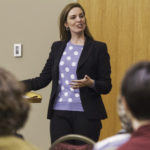WACO—When a woman feels called to ministry, she may follow a circuitous path before finding a place to fulfill her calling, a pastor, a hospice chaplain and a minister of discipleship told the Texas Baptist Women in Ministry Conference.
Cheryl Kimble, pastor of Highland Park Baptist Church in Austin; Cherry Moore, a hospice chaplain in Bryan; and Bernadine Davis, minister of discipleship and spiritual formation at David Chapel Missionary Baptist Church in Austin, participated in a panel discussion at the conference, held at Baylor University’s Truett Theological Seminary.
 Kimble worked 13 years as an elementary schoolteacher before she felt a call to ministry, Moore was—and continues to be—a visual artist, and Davis earned an accounting degree and worked in business. None grew up in a context where women in ministry were common.
Kimble worked 13 years as an elementary schoolteacher before she felt a call to ministry, Moore was—and continues to be—a visual artist, and Davis earned an accounting degree and worked in business. None grew up in a context where women in ministry were common.
Kimble described growing up “in a very traditional Southern Baptist church” before being ordained by a more progressive Oklahoma Baptist church. She recalled how she felt after she moved to Austin and attended her first Baptist General Convention of Texas annual meeting.
“I saw women on the stage. It was such a breath of fresh air for me,” she said.
Still, she found she was not altogether accepted among fellow Baptist pastors in Austin.
Good ol’ boys
“It’s certainly not the case with all of them, but to some degree, it’s still a good ol’ boys club,” she said.
Kimble served 12 years as an associate pastor at Highland Park Baptist Church before the church called her as senior pastor. She described the two years since then as a period of healing, learning and building a sense of community in the congregation.
Sign up for our weekly edition and get all our headlines in your inbox on Thursdays
Moore, who grew up in an American Baptist church in Ohio, initially thought she would be a missionary when she felt called to ministry “because it’s all I knew,” she said.
Instead, her career path included teaching art at a federal prison in Kentucky, raising two children—one with severe disabilities, and working as a hospital chaplain before going to work with a hospice in Bryan and teaching art at Blinn College.
All, but not all at once
When an acquaintance told her in recent years she “had it all” because she had worked in an artistic career she loved, fulfilled her calling to ministry through chaplaincy and enjoyed motherhood, she responded, “Yes, I’ve had it all—but not all at once.”
Serving on staff in a predominantly African-American Baptist church, Davis credited the support of her pastor, Joseph Parker, who led the church to become open to women in ministry.
For women who feel called but who are not allowed to live out their calling within their churches, Davis offered advice: “If your ministry context does not support your calling, consider changing your context.”
Davis, who told part of her story during a worship service at the conference and also participated in the panel discussion, noted she struggled to find her own voice in preaching because she had only male role models to follow in the pulpit.
“That’s when my pastor told me: ‘Preach in your own giftedness. Be who God called you to be,’” she recalled.
Davis noted she—and others from her church—faced some resistance from other African-American Baptist congregations that do not welcome women in ministry. But she found a way to deal with critics.
“I take any and all criticism to the Lord,” she said. “Then based on what God says to me, I will act on it.”














We seek to connect God’s story and God’s people around the world. To learn more about God’s story, click here.
Send comments and feedback to Eric Black, our editor. For comments to be published, please specify “letter to the editor.” Maximum length for publication is 300 words.